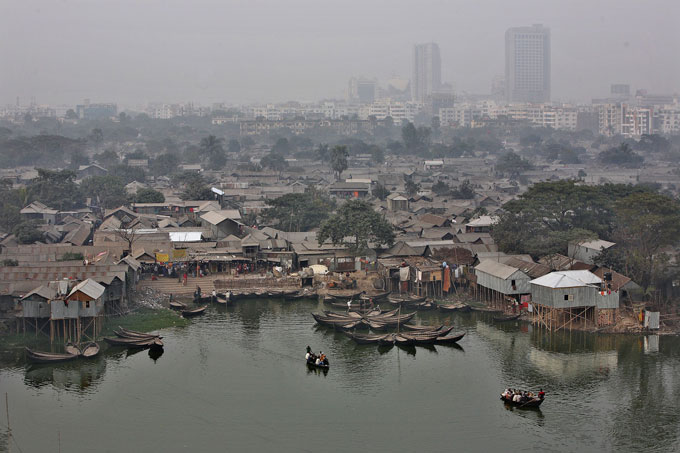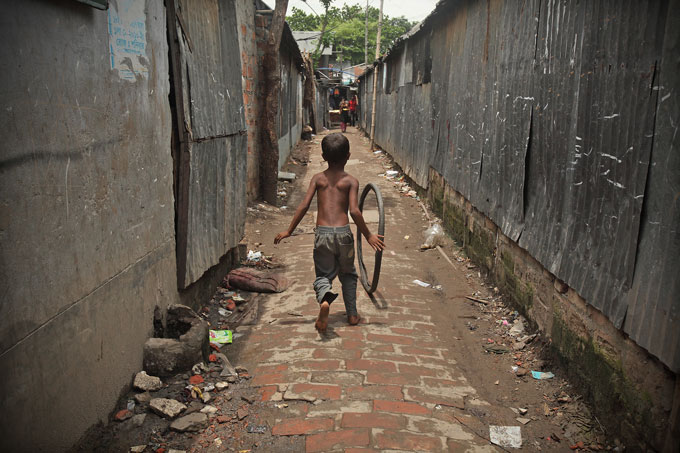Reading Time: 3 minutes
Over the past decade Bangladesh has been experiencing urbanisation at an unprecedented speed and scale. For Bangladesh, urbanisation has been identified as a leading engine of growth with the urban sector already contributing to more than 60 per cent of the GDP. On the downside, like in many other developing countries, this rapid urbanisation is also accompanied by increasing urban poverty and inequality.
Over the past decade Bangladesh has been experiencing urbanisation at an unprecedented speed and scale. For Bangladesh, urbanisation has been identified as a leading engine of growth with the urban sector already contributing to more than 60 per cent of the GDP. On the downside, like in many other developing countries, this rapid urbanisation is also accompanied by increasing urban poverty and inequality.
The majority of the urban population in Bangladesh is concentrated only in a few large cities like Dhaka, Chittagong and a number of growing secondary cities all of which are also hotspots for internal migration. Every year approximately 400,000 people migrate to Dhaka city alone – many of them end up living in slums and squatters where urban poverty is concentrated and often intensified.
One key characteristic of urban poverty is its multi-dimensionality which cannot be measured by lack of income alone. It needs to be understood in the broader context of deprivation of rights and entitlements, discrimination, inequality, and social injustice. According to a 2014 slum census there are nearly 14,000 slums and squatters in urban areas where more than 2.2 million people live. A large part of them are among the poorest and most marginalised population of the country. The status of slum dwellers’ health, education, housing and social security lags far behind in comparison to the national average.
In early 2015, BRAC rolled out the urban development programme (UDP). At the core of our intervention is a people-driven development approach, which is essential to ensure that the poor become active agents in the process of socioeconomic change rather than merely being passive recipients of development support.
Based on our long experience of community mobilisation, and also building on local and global best practices we are currently developing tools to effectively organise and mobilise the urban poor. This will give them greater bargaining power and a platform to engage with the duty bearers and service providers and demand and negotiate their rights and entitlements. With the UDP playing a facilitator role, the urban poor will be on the driving seat in identifying and prioritising local development challenges and finding appropriate solutions.
One of the key constraints to ensuring sustainable urban development is weak urban management and lack of pro-poor municipal governance. The urban poor, particularly the slum dwellers are often both physically and psychologically distanced from the institutions of urban governance. Our intervention will build on existing policies and legal frameworks to create sustainable mechanisms for the participation of poor urban dwellers in the urban management and governance process. This we hope to achieve by using context specific social accountability tools, like citizen report cards, social audits and public hearings. By the end of 2016, we will also introduce ICT-based tools to promote citizen journalism and connect the urban poor with the governance institutions and public authorities.
The transient nature of urban poor and lack of data beyond the basic demographics pose a big challenge in ensuring the population’s access to comprehensive and affordable services. Our health programme has already collected basic information on more than 90,000 slum dwellers in Dhaka city using a mobile-based app. In our target slums we will use this app to identify the most vulnerable groups and then connect them to services according to their needs- be it from BRAC, other NGOs or the government. Once this is done, from mid 2016, we will start building effective partnerships with government agencies, NGOs and the private sector that are aligned with our vision.
One of BRAC’s key strengths is to innovate and build on its learning. At UDP we have designed a learning and innovation component as an integral part of the programme. We believe that through the programme we will be able to develop an effective model for strengthening sustainable urban development in Bangladesh which may be replicated and scaled up across the country.
Kazi Fattah is the programme head of BRAC’s urban development programme.







